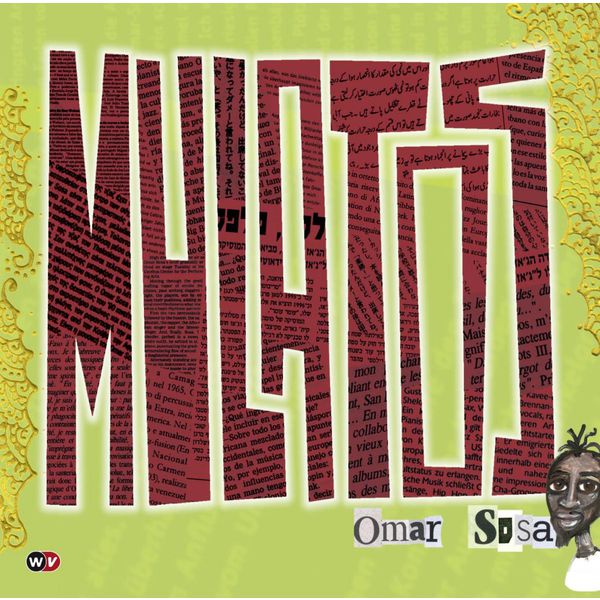
Streaming ilimitado
Escuche este álbum ahora en alta calidad en nuestras apps
Comenzar mi periodo de prueba gratis y escuchar este álbumDisfrute de este álbum en las apps Qobuz con sususcripción
SuscribirDisfrute de este álbum en las apps Qobuz con sususcripción
Descarga digital
Compre y descargue este álbum en múltiples formatos, según sus necesidades.
In various interviews, salsa/Latin jazz master Ray Barretto has complained about hard bop artists who employ Afro-Cuban rhythms in a very obvious way -- artists who will take a familiar Thelonious Monk, Clifford Brown, or Bud Powell standard and "Latinize" it by adding a son, cha cha, mambo, danzon, or guaguancó groove. There is nothing wrong with that approach (which can be quite enjoyable), but there is also something to be said for using Afro-Cuban/salsa elements in a less obvious fashion -- which is what Omar Sosa does on Mulatos. This post-bop release doesn't beat listeners over the head with Afro-Cuban rhythms, but they're present nonetheless. They enrich Sosa's material in their own subtle way, and the Cuban pianist/keyboardist (who employs Paquito D'Rivera as a clarinetist on three selections) demonstrates that Afro-Cuban jazz doesn't have to be something as overt as playing Monk's "Well, You Needn't" as a descarga (Latin jam) or approaching George Gershwin's "I Can't Get Started" as a bolero (Latin ballad). Afro-Cuban music isn't the only type of world music that inspires Sosa on Mulatos, which was recorded in Paris in early 2004; Sosa also brings elements of Middle Eastern, North African, and Indian music to his post-bop. Dhafer Youssef (one of the sidemen) is featured on the oud, a traditional Arabic lute that is quite legendary in Middle Eastern music -- and Philippe Foch, another participant, appears on Indian tabla drums. Of course, the oud and the tablas aren't exactly prominent instruments in Afro-Cuban jazz or salsa, but they're major assets on Mulatos -- an album that paints a consistently attractive picture of Sosa's multicultural outlook. Mulatos is yet another broad-minded project that Sosa can be proud to have in his catalog.
© Alex Henderson /TiVo
Está escuchando muestras.
Escuche más de 100 millones de pistas con un plan de streaming ilimitado.
Escuche esta playlist y más de 100 millones de pistas con nuestros planes de streaming ilimitado.
Desde 12,49€/mes

Presentación del Álbum
In various interviews, salsa/Latin jazz master Ray Barretto has complained about hard bop artists who employ Afro-Cuban rhythms in a very obvious way -- artists who will take a familiar Thelonious Monk, Clifford Brown, or Bud Powell standard and "Latinize" it by adding a son, cha cha, mambo, danzon, or guaguancó groove. There is nothing wrong with that approach (which can be quite enjoyable), but there is also something to be said for using Afro-Cuban/salsa elements in a less obvious fashion -- which is what Omar Sosa does on Mulatos. This post-bop release doesn't beat listeners over the head with Afro-Cuban rhythms, but they're present nonetheless. They enrich Sosa's material in their own subtle way, and the Cuban pianist/keyboardist (who employs Paquito D'Rivera as a clarinetist on three selections) demonstrates that Afro-Cuban jazz doesn't have to be something as overt as playing Monk's "Well, You Needn't" as a descarga (Latin jam) or approaching George Gershwin's "I Can't Get Started" as a bolero (Latin ballad). Afro-Cuban music isn't the only type of world music that inspires Sosa on Mulatos, which was recorded in Paris in early 2004; Sosa also brings elements of Middle Eastern, North African, and Indian music to his post-bop. Dhafer Youssef (one of the sidemen) is featured on the oud, a traditional Arabic lute that is quite legendary in Middle Eastern music -- and Philippe Foch, another participant, appears on Indian tabla drums. Of course, the oud and the tablas aren't exactly prominent instruments in Afro-Cuban jazz or salsa, but they're major assets on Mulatos -- an album that paints a consistently attractive picture of Sosa's multicultural outlook. Mulatos is yet another broad-minded project that Sosa can be proud to have in his catalog.
© Alex Henderson /TiVo
Acerca del álbum
- 1 disco(s) - 9 pista(s)
- Duración total: 00:55:28
- Artista principal: Omar Sosa
- Sello: world village
- Área: Cuba
- Género Jazz Latin jazz
 Por qué comprar en Qobuz...
Por qué comprar en Qobuz...
-
Escuche su música en streaming o descárguela
Compre un álbum o una pista individual. O escuche nuestro catálogo completo con nuestras suscripciones ilimitadas de streaming en alta calidad.
-
Sin DRM
Las pistas descargadas le pertenecen, sin límite de utilización. Y además las puede descargar todas las veces que lo necesite.
-
Elija el formato que más le convenga
Descargue sus compras en una amplia variedad de formatos (FLAC, ALAC, WAV, AIFF...) dependiendo de sus necesidades.
-
Escuche sus compras en nuestras apps
Descargue las aplicaciones Qobuz para smartphones, tabletas u ordenadores, y escuche sus compras en cualquier lugar.



